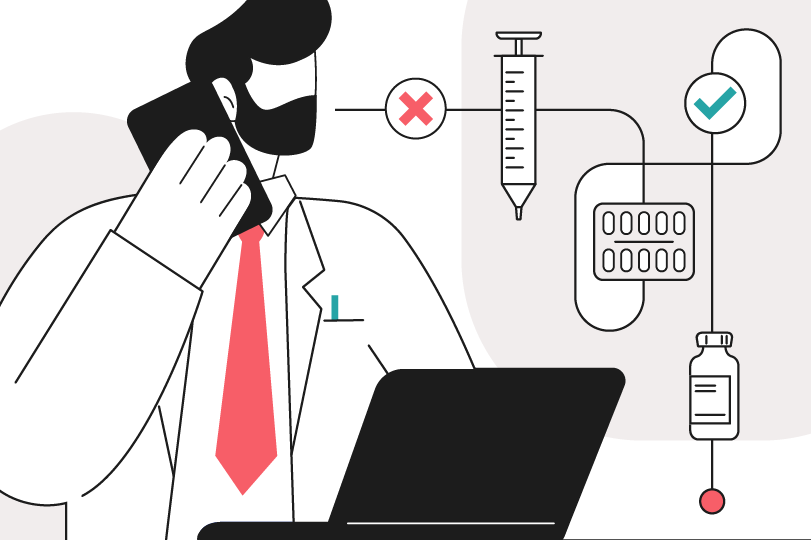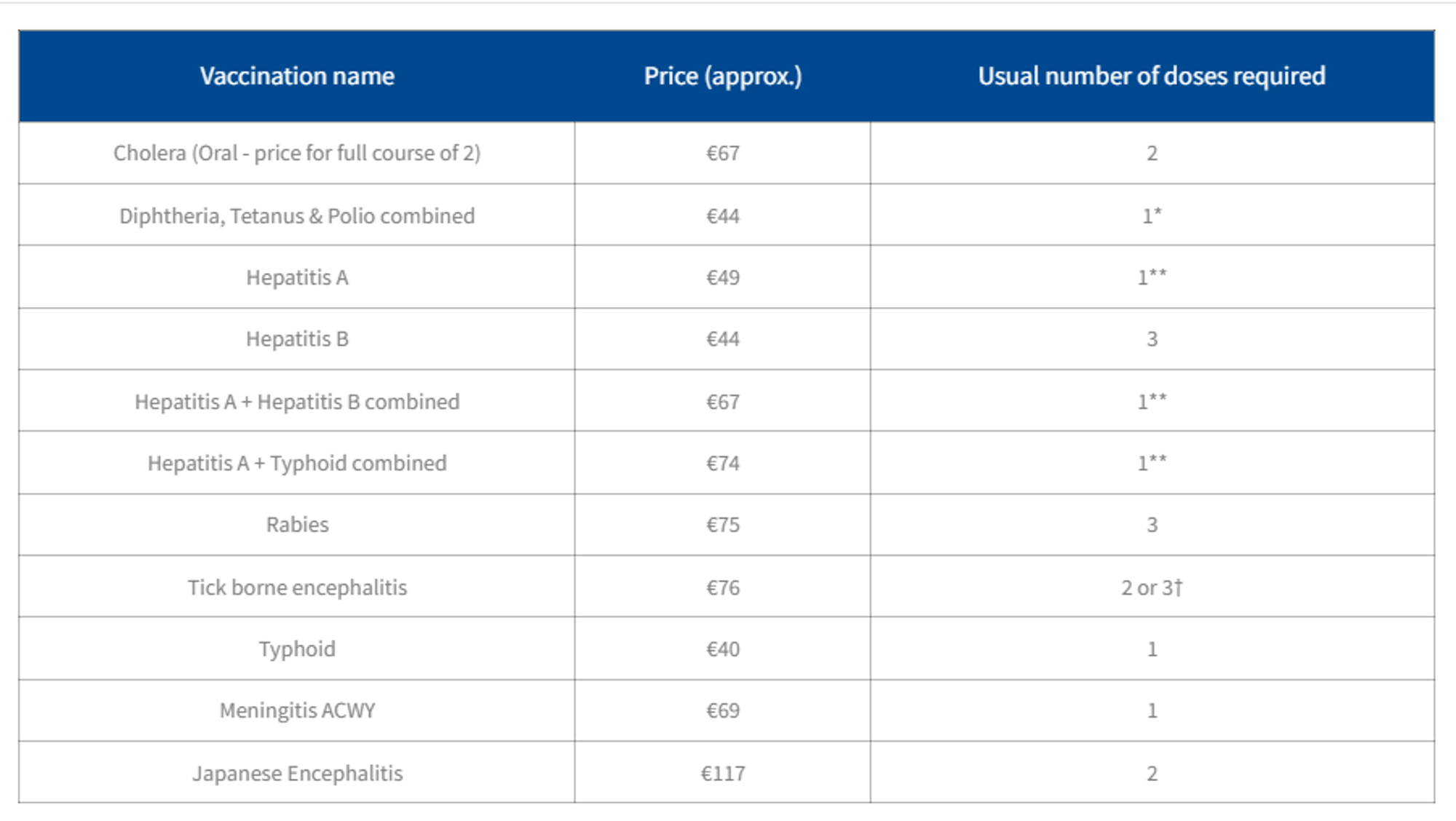
Travel health services
Travel health assessments only €50
What you'll need
To complete your travel health consultation, you'll need:
- Up-to-date contact details
- Details of your trip (destination(s), dates and planned activities etc)
- Details of any medical conditions or medication you're taking
- History of previous vaccinations, if known

Which vaccinations?
Travel destination
Our virtual travel health clinic makes preparing for travel a breeze. To find out which vaccinations you might need, first tell us:
Where are you going?
Advised vaccinations
All travellers to Africa should consider at least the following vaccinations before travel:
- Hepatitis A
- Typhoid
- Routine vaccinations such as measles, mumps & rubella (MMR), as well as polio, tetanus, diphtheria and whooping cough (pertussis). If you haven't received a tetanus injection in the past 10 years, you may require a booster dose before travel.
Yellow fever
IMPORTANT: If you're entering a country from another country where yellow fever is present, you'll need to show a certificate of vaccination (ICVP) on arrival. You will not be allowed to enter some countries if you haven't received the vaccination. If you need vaccination against yellow fever you should attend your GP or local travel clinic. Read more about yellow fever.
Recommended vaccinations
Other vaccinations which may be recommended include:
- Cholera: For those spending extended periods in rural locations and/or surrounded by significant poverty, or where you may have difficulty in accessing clean water. Read more about cholera prevention.
- Meningitis (Meningococcal): Vaccination is recommended for those planning to travel to countries in the ‘African Meningitis Belt’ (extending from Ethiopia in the east to Senegal in the west), or to areas affected by meningococcal outbreaks. Read more about meningitis risks.
- Rabies: For those who are likely to come in contact with animals in parts of the world where rabies is common. Vaccination may be recommended if you are planning outdoor activities as a part of your trip (like hiking, adventure travel or caving) or travelling in rural locations that could put you at risk of an animal bite and where access to medical treatment is poor. Read more about rabies.
Malaria
When travelling in Africa, you should take precautions to avoid mosquito bites to prevent malaria. You may need to take antimalarial tablets before, during, and after your trip to prevent infection, depending on your travel plans, such as where you're going, when you're travelling, and whether you're spending a lot of time outdoors. Read more about malaria prevention.
Dengue fever
It's also very important to reduce your risk of dengue fever by avoiding mosquito bites during your trip. Read more about dengue fever.
There are no mandatory vaccinations required to enter Australia.
However, it's advisable to be up-to-date on routine vaccinations while travelling, including measles, mumps & rubella (MMR), as well as polio, tetanus, diphtheria and whooping cough (pertussis).
Tetanus
You should also consider having a tetanus booster dose if you haven't had one in the past 10 years. A booster dose provides 10 years of protection against tetanus and means that in the event of a cut, you won't need to look for a tetanus injection.
Yellow fever
There is no risk of yellow fever in Australia. However, if you're entering the country from another country where yellow fever is present, you'll need to show a certificate of vaccination (ICVP) on arrival. If you need vaccination against yellow fever you should attend your GP or local travel clinic. Read more about yellow fever.
Recommended vaccinations
Other vaccinations which may be recommended include:
- Hepatitis A: While the risk is low, Hepatitis A can be spread through contaminated food or water in Australia, so speak to your doctor to see if the hepatitis A vaccine is right for you. Read more about Hepatitis A.
- Hepatitis B: This can be spread by sexual contact, contaminated needles, and blood products, so you should consider this vaccination if you might have sex with a new partner, get a tattoo or piercing, or have any medical procedures during your trip. Read more about Hepatitis B.
- Japanese Encephalitis: You may need this vaccine if you're visiting certain remote areas of Australia for more than a month, or if you'll be spending a lot of time outdoors in those areas during a shorter trip. Read more about Japanese Encephalitis.
- Rabies: Rabies is present in bats in Australia, however it's not a major risk to most travellers. Vaccination may be recommended if you're planning outdoor activities as a part of your trip (like hiking, adventure travel or caving) or travelling in rural locations that could put you at risk of an animal bite and where access to medical treatment is poor. Read more about rabies.
Malaria
Mainland Australia is free of malaria, but malaria is occasionally present in the Torres Strait Islands.
Advised vaccinations
All travellers to China should consider at least the following vaccinations before travel:
- Hepatitis A
- Typhoid
- Routine vaccinations such as measles, mumps & rubella (MMR), as well as polio, tetanus, diphtheria and whooping cough (pertussis). If you haven't received a tetanus injection in the past 10 years, you may require a booster dose before travel.
Yellow fever
There is no risk of yellow fever in China. However, if you're entering the country from another country where yellow fever is present, you'll need to show a certificate of vaccination (ICVP) on arrival. If you need vaccination against yellow fever you should attend your GP or local travel clinic. Read more about yellow fever.
Recommended vaccinations
Other vaccinations which may be recommended include:
- Hepatitis B: This can be spread by sexual contact, contaminated needles, and blood products, so you should consider this vaccination if you might have sex with a new partner, get a tattoo or piercing, or have any medical procedures during your trip. Read more about Hepatitis B.
- Japanese Encephalitis: You may need this vaccine if your trip will last more than 4 weeks, depending on the region you're going to and at what time of year you're travelling. You should also consider this vaccine if you plan to visit rural areas in China or plan to spend a lot of time outdoors, especially near livestock, even for trips shorter than a month. Read more about Japanese Encephalitis.
- Rabies: For those who are likely to come in contact with animals in parts of the world where rabies is common. Rabies can be found in dogs, bats, and other mammals in China. Vaccination may be recommended if you are planning outdoor activities as a part of your trip (like hiking, adventure travel or caving) or travelling in rural locations that could put you at risk of an animal bite and where access to medical treatment is poor. Read more about rabies.
- Polio: You may need a polio vaccine or booster before your trip if you're visiting Xinjiang province, especially if you're working in a health care facility, refugee camp, or humanitarian aid setting. If you were vaccinated against polio as a child but have never had a booster dose as an adult, you should get this booster dose before travelling. Adults need only one polio booster in their lives. If you weren't completely vaccinated as a child or don't know your vaccination status, speak with your GP about getting vaccinated. Read more about polio.
Malaria
When travelling in China, you should take precautions to avoid mosquito bites to prevent malaria. You may need to take antimalarial tablets before, during, and after your trip to prevent infection, depending on your travel plans, such as where you're going, when you're travelling, and whether you'll be spending a lot of time outdoors. Rare cases are reported in the counties along the China-Burma (Myanmar) border in Yunnan Province and Motuo County in Tibet. No malaria in areas where most major river cruises pass. Read more about malaria in China.
Advised vaccinations
All travellers to India should consider at least the following vaccinations before travel:
- Hepatitis A
- Typhoid
- Routine vaccinations such as measles, mumps & rubella (MMR), as well as polio, tetanus, diphtheria and whooping cough (pertussis). If you haven't received a tetanus injection in the past 10 years, you may require a booster dose before travel.
Yellow fever
There is no risk of yellow fever in India. However, if you're entering the country from another country where yellow fever is present, you'll need to show a certificate of vaccination (ICVP) on arrival. If you need vaccination against yellow fever you should attend your GP or local travel clinic. Read more about yellow fever.
Recommended vaccinations
Other vaccinations which may be recommended include:
- Hepatitis B: This can be spread by sexual contact, contaminated needles, and blood products, so you should consider this vaccination if you might have sex with a new partner, get a tattoo or piercing, or have any medical procedures during your trip. The risk is also increased for those working in clinical or humanitarian aid-work settings. Read more about Hepatitis B.
- Japanese Encephalitis: You may need this vaccine if your trip will last more than 4 weeks, depending on the region you're going to and at what time of year you're travelling. You should also consider this vaccine if you plan to visit rural areas in China or plan to spend a lot of time outdoors, especially near livestock, even for trips shorter than a month. Read more about Japanese Encephalitis.
- Rabies: For those who are likely to come in contact with animals in parts of the world where rabies is common. Rabies can be found in dogs, bats, and other mammals in China. Vaccination may be recommended if you are planning outdoor activities as a part of your trip (like hiking, adventure travel or caving) or travelling in rural locations that could put you at risk of an animal bite and where access to medical treatment is poor. Read more about rabies.
- Cholera: Vaccination is recommended for adults who are travelling to areas of active cholera transmission. Cholera is present in India, and while it is rare, in travellers it can be severe. Avoiding unsafe food and water and washing your hands can help prevent cholera. Certain factors increase the risk of getting cholera or having severe disease. Read more about cholera.
Malaria
When travelling in India, you should take precautions to avoid mosquito bites to prevent malaria. You may need to take antimalarial tablets before, during, and after your trip to prevent infection, especially if you're visiting low-altitude areas.
All areas throughout India have malaria present, including the cities of Mumbai (Bombay) and Delhi, except none in areas >2,000 m (6,562 ft) in Himachal Pradesh, Jammu and Kashmir, and Sikkim (source: CDC). Read more about malaria prevention.
Dengue fever
It's also very important to reduce your risk of dengue fever by avoiding mosquito bites during your trip. Read more about dengue fever.
Advised vaccinations
Most travellers to South America should receive the following vaccinations before travel:
- Hepatitis A
- Typhoid
- Yellow fever: This is a legal requirement for entry into some countries. While vaccination against yellow fever is not always required for travel to individual South American countries, it is required if you are travelling to more than one South American country. If you need vaccination against yellow fever you should attend your GP or local travel clinic. Read more about yellow fever.
- Routine vaccinations such as measles, mumps & rubella (MMR), as well as polio, tetanus, diphtheria and whooping cough (pertussis). If you haven't received a tetanus injection in the past 10 years, you may require a booster dose before travel.
Recommended vaccinations
Other vaccinations which may be recommended include:
- Hepatitis B: This can be spread by sexual contact, contaminated needles, and blood products, so you should consider this vaccination if you might have sex with a new partner, get a tattoo or piercing, or have any medical procedures during your trip. Read more about Hepatitis B.
- Rabies: For those who are likely to come in contact with animals in parts of the world where rabies is common. Rabies can be found in dogs, bats, and other mammals in South America. Vaccination may be recommended if you are planning outdoor activities as a part of your trip (like hiking, adventure travel or caving) or travelling in rural locations that could put you at risk of an animal bite and where access to medical treatment is poor. Read more about rabies.
- Meningitis (Meningococcal): The risk for the majority of travellers is low however vaccination may be recommended for those spending extended periods of travel in densely populated areas or in locations where the disease is present, such as health workers or volunteers. Read more about meningitis risks.
Malaria
Malaria occurs in every South American country except Chile, Uruguay and the Falkland Islands (Islas Malvinas). When travelling in affected regions, you should take precautions to avoid mosquito bites to prevent malaria. You may need to take antimalarial tablets before, during, and after your trip to prevent infection, depending on your travel plans, such as where you're going, when you're travelling, and whether you're spending a lot of time outdoors. Read more about malaria prevention.
Dengue fever
It's also very important to reduce your risk of dengue fever by avoiding mosquito bites during your trip. Read more about dengue fever.
Advised vaccinations
Most travellers to Southeast Asia should receive the following vaccinations before travel:
- Hepatitis A
- Typhoid
- Routine vaccinations such as measles, mumps & rubella (MMR), as well as polio, tetanus, diphtheria and whooping cough (pertussis). If you haven't received a tetanus injection in the past 10 years, you may require a booster dose before travel.
Yellow fever
Yellow fever is not found in Southeast Asia. However, if you're entering the country from another country where yellow fever is present, you'll need to show a certificate of vaccination (ICVP) on arrival. If you need vaccination against yellow fever you should attend your GP or local travel clinic. Read more about yellow fever.
Recommended vaccinations
Other vaccinations which may be recommended include:
- Hepatitis B: This can be spread by sexual contact, contaminated needles, and blood products, so you should consider this vaccination if you might have sex with a new partner, get a tattoo or piercing, or have any medical procedures during your trip. The risk is also increased for those working in clinical or humanitarian aid-work settings. Read more about Hepatitis B.
- Japanese Encephalitis: You may need this vaccine if your trip will last more than 4 weeks, depending on the region you're going to and at what time of year you're travelling. You should also consider this vaccine if you plan to visit rural areas in China or plan to spend a lot of time outdoors, especially near livestock, even for trips shorter than a month. Read more about Japanese Encephalitis.
- Rabies: For those who are likely to come in contact with animals in parts of the world where rabies is common. Rabies can be found in dogs, bats, and other mammals in Southeast Asia. Vaccination may be recommended if you're planning outdoor activities as a part of your trip (like hiking, adventure travel or caving) or travelling in rural locations that could put you at risk of an animal bite and where access to medical treatment is poor. Read more about rabies.
Malaria
When travelling in Southeast Asia, you should take precautions to avoid mosquito bites to prevent malaria. You may need to take antimalarial tablets before, during, and after your trip to prevent infection, depending on your travel plans, such as where you're going, when you're travelling, and whether you're spending a lot of time outdoors. Read more about malaria prevention.
Dengue fever
It's also very important to reduce your risk of dengue fever by avoiding mosquito bites during your trip. Read more about dengue fever.
Recommended vaccinations
Most travellers to Thailand should receive the following vaccinations before travel:
- Hepatitis A
- Typhoid
- Routine vaccinations such as measles, mumps & rubella (MMR), as well as polio, tetanus, diphtheria and whooping cough (pertussis). If you haven't received a tetanus injection in the past 10 years, you may require a booster dose before travel.
Yellow fever
Yellow fever is not found in Thailand. However, if you're entering the country from another country where yellow fever is present, you'll need to show a certificate of vaccination (ICVP) on arrival. If you need vaccination against yellow fever you should attend your GP or local travel clinic. Read more about yellow fever.
Recommended vaccinations
Other vaccinations which may be recommended include:
- Hepatitis B: This can be spread by sexual contact, contaminated needles, and blood products, so you should consider this vaccination if you might have sex with a new partner, get a tattoo or piercing, or have any medical procedures during your trip. Read more about Hepatitis B.
- Japanese Encephalitis: You may need this vaccine if your trip will last more than 4 weeks, depending on the region you're going to and at what time of year you're travelling. You should also consider this vaccine if you plan to visit rural areas in Thailand or plan to spend a lot of time outdoors, especially near livestock, even for trips shorter than a month. Read more about Japanese Encephalitis.
- Rabies: For those who are likely to come in contact with animals in parts of the world where rabies is common. Rabies can be found in dogs, bats, and other mammals in Thailand. Vaccination may be recommended if you're planning outdoor activities as a part of your trip (like hiking, adventure travel or caving) or travelling in rural locations that could put you at risk of an animal bite and where access to medical treatment is poor. Read more about rabies.
Malaria
When travelling in Thailand, you should take precautions to avoid mosquito bites to prevent malaria. You may need to take antimalarial tablets before, during, and after your trip to prevent infection, depending on your travel plans, such as where you're going, when you're travelling, and whether you'll spend a lot of time outdoors.
Areas of Thailand with risk of malaria:
Primarily in provinces that border Burma (Myanmar), Cambodia, and Laos and the provinces of Kalasin, Krabi (Plai Phraya district), Nakhon Si Thammarat, Narathiwat, Pattani, Phang Nga (including Phang Nga City), Rayong, Sakon Nakhon, Songkhla, Surat Thani, and Yala, especially the rural forest and forest fringe areas of these provinces. Rare to few cases in other parts of Thailand, including other parts of Krabi Province and the cities of Bangkok, Chiang Mai, Chiang Rai, Koh Phangan, Koh Samui, and Phuket. None in the islands of Krabi Province (Koh Phi Phi, Koh Yao Noi, Koh Yao Yai, and Ko Lanta) and Pattaya City (source: CDC).
Read more about malaria prevention.
Dengue fever
It's also very important to reduce your risk of dengue fever by avoiding mosquito bites during your trip. Read more about dengue fever.
Advised vaccinations
All travellers to Africa should consider at least the following vaccinations before travel:
- Hepatitis A
- Typhoid
- Routine vaccinations such as measles, mumps & rubella (MMR), as well as polio, tetanus, diphtheria and whooping cough (pertussis). If you haven't received a tetanus injection in the past 10 years, you may require a booster dose before travel.
Yellow fever
IMPORTANT: If you're entering a country from another country where yellow fever is present, you'll need to show a certificate of vaccination (ICVP) on arrival. You will not be allowed to enter some countries if you haven't received the vaccination. If you need vaccination against yellow fever you should attend your GP or local travel clinic. Read more about yellow fever.
Recommended vaccinations
Other vaccinations which may be recommended include:
- Cholera: For those spending extended periods in rural locations and/or surrounded by significant poverty, or where you may have difficulty in accessing clean water. Read more about cholera prevention.
- Meningitis (Meningococcal): Vaccination is recommended for those planning to travel to countries in the ‘African Meningitis Belt’ (extending from Ethiopia in the east to Senegal in the west), or to areas affected by meningococcal outbreaks. Read more about meningitis risks.
- Rabies: For those who are likely to come in contact with animals in parts of the world where rabies is common. Vaccination may be recommended if you are planning outdoor activities as a part of your trip (like hiking, adventure travel or caving) or travelling in rural locations that could put you at risk of an animal bite and where access to medical treatment is poor. Read more about rabies.
Malaria
When travelling in Africa, you should take precautions to avoid mosquito bites to prevent malaria. You may need to take antimalarial tablets before, during, and after your trip to prevent infection, depending on your travel plans, such as where you're going, when you're travelling, and whether you're spending a lot of time outdoors. Read more about malaria prevention.
Dengue fever
It's also very important to reduce your risk of dengue fever by avoiding mosquito bites during your trip. Read more about dengue fever.
Secure, trusted services
How it works
Complete an online travel health assessment.

Schedule your travel consultation with one of our IMC registered GPs to discuss vaccinations and/or antimalarial tablets you might need.

Your vaccination prescription will be emailed through, with a link to book an appointment at a local participating pharmacy.

Head to your chosen pharmacy for your appointment. You'll pay for your vaccinations when you get there.

Frequently asked questions
Vaccinations can protect you against a range of serious diseases. Although the childhood vaccination programme in Ireland protects you from many diseases, extra vaccinations are recommended if you're planning on travelling to certain parts of the world.
You must be 16 years or older to use this service.
Vaccinations should be considered if you're travelling to areas outside of Western Europe, North America, Australia, and New Zealand.
The vaccines you need to get before travelling will depend on a number of factors, including:
- Where you plan to travel. Travelling in developing countries and rural areas can bring you into contact with more diseases, which means you might need additional vaccines. Some countries may also require proof of vaccination for certain diseases such as yellow fever or polio for those entering the country.
- Your health. If you are pregnant, have a chronic illness or a weakened immune system, you may need additional vaccines.
- Your vaccination history. It’s important to stay up-to-date with your routine vaccinations. While diseases like measles are rare in Ireland, they're more common in other countries.
Travel vaccines can be categorised as being:
- Required (legal requirement for entering a country)
- Routine
- Optional (the disease is present in the country but is the risk of transmission may be low)
In general, the only vaccines that may be required are:
- Yellow fever (depending on the country)
- Meningitis (for pilgrims to Saudi Arabia during the Hajj)
- Polio (an exit requirement for travellers spending more than 4 weeks in countries such as Nigeria, Ethiopia and Pakistan)
There is no set list of recommended vaccines for travelling to a particular country. Various international agencies, such as the World Health Organisation and U.S. Centre for Disease Control, produce their own list of recommended vaccines.
It's important to find a balance between protecting yourself against as many diseases as possible and avoiding the cost and potential side-effects of unnecessary vaccinations. The recommendations provided on this site reflect various international agency recommendations and are not intended to replace or conflict with the advice given to you by your doctor.
While travel vaccines protect against many travel-related diseases, few offer 100% protection. It is important to always take general precautions to reduce your risk of exposure to disease when travelling. If you feel ill following your return to Ireland, make sure that you see a doctor as soon as possible.
Payment for your vaccinations is made when attending your chosen pharmacy.

- The primary course of diphtheria, tetanus and polio (DTP) is part of the standard childhood immunisation programme in Ireland. If you've received the primary course, you may need a booster of one dose. If you haven't received a primary course previously, you may require additional vaccinations.
- *Primary course, excludes booster
† The appropriate dosage regime will depend on travel dates and will be advised during the travel health consultation with your doctor
Travel vaccinations can now be given by specially trained pharmacists at participating pharmacies nationwide.
Once you complete your Travel Health Consultation, you'll be able to book a time to have your vaccine administered at your nearest participating pharmacy.
Travel vaccinations can also be administered by your GP or by visiting a travel health clinic.
Start the process of vaccination well before you plan to travel. Some vaccinations take time to become effective so allow at least 4-6 weeks to protect yourself fully. This will give the vaccines time to start working, so you’re protected while travelling. It will also usually allow enough time for you to get vaccines that require more than 1 dose. An early start to the process is especially important if you plan to travel with children.
Yellow fever: If you're entering a country from another country where yellow fever is
present, you may need to show a certificate of vaccination (ICVP) on arrival. You will not be allowed to enter some countries if you haven't received the vaccination. If you need vaccination against yellow fever you should attend your GP or local travel clinic.
In some cases, while yellow fever may be present in a country, large parts of the country may not be affected. If vaccination is not legally required and you are travelling to an unaffected part of the country, and not travelling to a neighbouring country that is infected, you will not need to be vaccinated. Read more about yellow fever.
Additional resources:
- Visit the CDC’s travel website to find out which vaccines you may need based on where you plan to travel, what you’ll be doing, and any health conditions you have.
- Visit the NHS Fit For Travel website to find out which vaccinations are necessary or recommended for the areas you'll be visiting
At HealthHero we are able to prescribe:
- Cholera (oral)
- Hepatitis A
- Hepatitis B
- Hep A/Hep B
- Japanese Encephalitis
- Rabies
- Typhoid
- Hep A + Typhoid
- Tetanus, Diphtheria & Polio
- Meningitis
- Tick borne encephalitis
We also strongly recommend making sure that your childhood immunisations are up-to-date to protect you against diseases like:
- Measles, mumps and rubella (MMR)
- Diphtheria, tetanus and polio (DTP)
Travellers not sure of their vaccination history should check with their GP.
The yellow fever vaccine is a live vaccine and is only stocked/ stored in practice with a specific license.
You will need to attend your GP or book in with a specific travel clinic to get this vaccine administered.